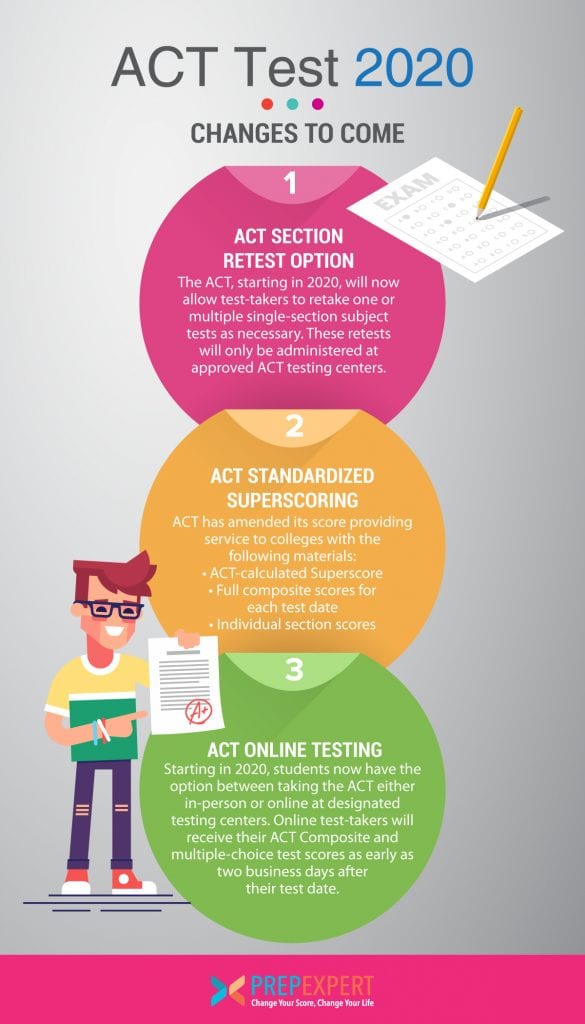ACT Test 2020 Changes To Come
Not since the last 2016 restructuring has the ACT gone through significant changes. All of that is about to change in 2020…
Get the latest information on the ACT Test 2020 changes.
Learn how to prepare for standardized tests with our year-round SAT prep and ACT prep courses today.
[act_one]
Changes To Come In 2020
The ACT is making another leap forward with its latest format updates.
Starting with the September 2020 test date, the ACT is rolling out a number of changes to the test. Their stated reasons for doing so include:
- A better test-taking experience
- More choices to improve scores
- Creating greater confidence that scores accurately reflect students’ hard work and academic achievements.
These changes will have a long-term effect on all upcoming high school juniors and seniors.
ACT Section Retest Option
Students can now improve their individual section scores with ease.
The ACT test students across multiple sections:
- English
- Math
- Reading
- Writing
- Science
It used to be that if you are weak in specific sections and wanted to improve, you needed to retake the entire test. Not only does this cost more money, but it also forces students to have to prep for every section, instead of focusing on problem areas.
The ACT, starting in 2020, will now allow test-takers to retake one or multiple single-section subject tests as necessary. These retests will only be administered at approved ACT testing centers.
The retests themselves are identical in content, timing, and question amount, as the regular test. Retests will be offered seven times per year, coinciding with regular national ACT test dates.
On individual test dates, students can take up to three section-specific retests at a time, with no limit on retests themselves.
[act_two]
ACT Standardized Superscoring
The ACT will now provide students additional score report options to colleges based on superscoring.
After conducting extensive research, ACT has amended its score providing service to colleges with the following materials:
- Full composite scores
- An ACT-calculated Superscore
Superscoring is a trend that more colleges and universities have adopted in recent years. It allows students to submit multiple score reports. Colleges then average the highest section scores together into a new composite score.
What makes this development new is that the ACT Superscore is a new recalculation. This calculation takes into account the highest possible composite scores and ACT section retests. Colleges and universities will now have access to:
- ACT-calculated Superscore
- Full composite scores for each test date
- Individual section scores
Again, superscoring isn’t a mandatory practice in higher education, but enough institutions do it that the ACT is taking the legwork away from them. The hope is that better-informed admissions decisions can be made in less time.
ACT Online Testing
Starting in 2020, students now have TWO options to take the test.
With more students preferring to learn online, it’s become natural for testing to start moving there too. That’s why, for the first time, students have the option between taking the ACT either in-person or online.
The main reasons behind this update are simple:
- Reducing student test anxiety
- Encouraging better focus on their test prep
Many kids simply get nervous taking tests in-person. Even if they know the information, the added pressure affects them. Another new benefit students receive is receiving test results faster than before.
Online test-takers will receive their ACT Composite and multiple-choice test scores as early as two business days after their test date. This fast turnaround time will better aid school and scholarship planning.
Students can better determine if another test date is necessary. For the actual online test, students can only take it at designated testing centers on provided desktop computers or other devices by staff.
[act_three]
For more test strategy, college admissions, and scholarship application tips sign up for our FREE class happening right now!
ACT Test 2020 Changes FAQ
Why is the ACT being updated in 2020?
The stated reasons for this update are – a better test-taking experience, more choices to improve scores, and creating greater confidence that scores accurately reflect students’ hard work and academic achievements.
How does the new retest option work?
The ACT, starting in 2020, will now allow test-takers to retake one or multiple single-section subject tests as necessary. These retests will only be administered at approved ACT testing centers. The retests themselves are identical in content, timing, and question amount, as the regular test. Retests will be offered seven times per year, coinciding with regular national ACT test dates. On individual test dates, students can take up to three section-specific retests at a time, with no limit on retests themselves.
What’s the deal with the new superscoring change?
ACT has amended its score providing service to colleges with the following materials – full composite scores, an ACT-calculated Superscore. What makes this development new is that the ACT Superscore is a new recalculation. This calculation takes into account the highest possible composite scores and ACT section retests.
What are some benefits for the new online testing option?
Online test-takers will receive their ACT Composite and multiple-choice test scores as early as two business days after their test date. This fast turnaround time will better aid school and scholarship planning. Students can better determine if another test date is necessary. For the actual online test, students can only take it at designated testing centers on provided desktop computers or other devices by staff.
Written by Dr. Shaan Patel MD MBA
Prep Expert Founder & CEO
Shark Tank Winner, Perfect SAT Scorer, Dermatologist, & #1 Bestselling AuthorMore from Dr. Shaan Patel MD MBA

How to Get Into Stanford: Breaking Down Stanford Admission Requirements in 2024
Applying to college is overwhelming no matter what schools are on your list, but you might find yourself sweating a…

Why DEI is Destroying Meritocracy and How MEI Can Save Us
In recent years, Diversity, Equity, and Inclusion (DEI) initiatives have become a cornerstone of many corporate and educational policies. While…

Should I Take an SAT Prep Course?
If you’re getting ready to take the SAT soon, you might be wondering whether or not you should enroll in…
